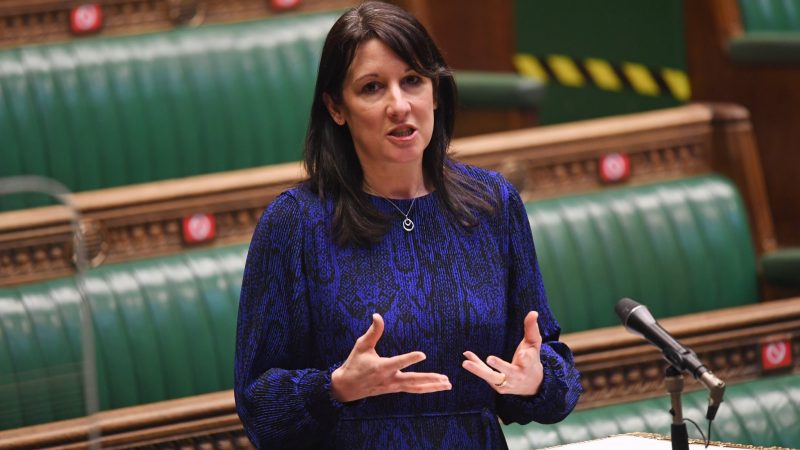
Rachel Reeves has urged the government to “get a grip” on rising energy bills, describing Ofgem’s announcement that the energy price cap is expected to rise to £2,800 as “extremely concerning”.
Ofgem’s chief executive Jonathan Brearley told MPs today that the energy regulator expects to increase the cap on energy bills by more than £800 in October. The cap is currently £1,971, having increased by £693 in April.
The Shadow Chancellor said: “This is extremely concerning and will cause huge worry for families already facing soaring bills and rising inflation. How many more alarm bells does the Chancellor need to hear before he acts?
“The government have got to get a grip on this crisis and to protect families and our economy. Yet again, Labour calls urgently on the government to bring forward an emergency Budget, with a windfall tax on oil and gas producer profits to lower bills for families.”
Appearing before the business, energy and industrial strategy committee, Brearley said the current situation was a “once-in-a-generation event not seen since the oil crisis of the 1970s”.
He told MPs: “I’ll be writing to the Chancellor to give him our latest estimate of the price cap uplift. This is uncertain, we’re only part-way through the price cap window, but we’re expecting a price cap in October in the region of £2,800.”
Brearley explained that conditions have worsened in the global gas market following Russia’s invasion of Ukraine. He said, looking beyond October, Ofgem are “managing between two extreme versions of events”.
“One where the price falls back down to where it was before – for example, if we did see peace in Ukraine. And one where prices could go even further if we were to see, for example, a disruptive interruption of gas from Russia,” he said.
The TUC has released analysis today that found that the projected rise in the price cap will mean that energy bills this year are rising 23 times faster than wages and 38 times faster than benefits.
TUC general secretary Frances O’Grady said: “Millions of families are already at breaking point. But now they face even more bill hikes, while ministers do nothing to make sure wages and Universal Credit keep pace. The Chancellor must provide more help to families now. We need an emergency Budget – it’s time to get on with it.
“The best way to get cash to low and middle-income families fast is through a big boost to Universal Credit. And we need a major programme of energy grants to cut bills – funded through a windfall tax on the profits of energy companies.”
Reacting to Ofgem’s announcement, End Fuel Poverty Coalition co-ordinator Simon Francis said: “This news will be utterly devastating for the 6.1 million homes currently in fuel poverty – and for the additional 1.7 million households who will now spend this winter struggling to keep themselves warm.”
He urged ministers to impose a windfall tax on energy production firms, invest in improving the energy efficiency of buildings and focus on delivering a “renewable-led secure energy infrastructure”, saying: “Unless the government acts now, it will have blood on its hands this winter.”
Miriam Brett, director of research and advocacy at Commonwealth, told LabourList: “The decision by Ofgem to allow energy bills to soar higher is unjustifiable. An eye-watering 800 a year increase will plunge millions of households into deeper fuel poverty at a time when so many are already struggling to afford basic necessities.
“Amid rising poverty and widespread insecurity it cannot be right that big energy companies are making vast, unexpected profits from volatile prices. As a matter of urgency, a windfall tax is needed to alleviate the unbearable hardship facing households.
“This crisis is rooted in much deeper, systemic problems embedded in the design of our privatised energy system. Taking the energy sector back into public ownership must be key to delivering energy to households at cost-price, creating more and better-paid jobs and securing a just transition to a green economy.”
Ofgem announced in February that the price cap would increase by £693 from April for customers on default tariffs paying by direct debit, from £1,277 to £1,971 per year. Prepayment customers saw an increase of £708, from £1,309 to £2,017.
Labour has repeatedly called for an emergency Budget to respond to the cost-of-living crisis. It would prioritise cutting domestic energy bills, reducing business rates, scrapping the National Insurance rise, improving home insulation and commissioning the National Crime Agency to recover money lost through fraud.
The opposition party first called for a windfall tax on the excess profits of oil and gas companies in January. It proposes to use the revenue raised to fund a VAT cut on home energy bills and expand the Warm Homes Discount.
Labour tabled amendments to the Queen’s Speech last week calling for a windfall tax and an emergency Budget, both of which were rejected by MPs.




More from LabourList
‘Council Tax shouldn’t punish those who have the least or those we owe the most’
Two-thirds of Labour members say government has made too many policy U-turns, poll reveals
‘Two states, one future: five steps on the path to peace for Israelis and Palestinians’